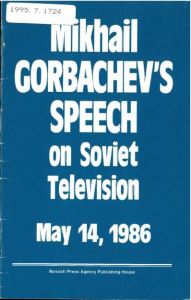 This week, the news from Ukraine has been tentatively positive, as the concerted counter-attack against the Russian army in the south of the country has been getting under way. But ongoing concerns about the situation at the Zaporizhzhia Nuclear Power Plant have also been in the headlines as, of course, has been the death of Mikhail Gorbachev.
This week, the news from Ukraine has been tentatively positive, as the concerted counter-attack against the Russian army in the south of the country has been getting under way. But ongoing concerns about the situation at the Zaporizhzhia Nuclear Power Plant have also been in the headlines as, of course, has been the death of Mikhail Gorbachev.
Gorbachev was adored and hated for the actions he took and for the events that happened during his time as Soviet leader. It was Yeltsin who formally acknowledged Ukrainian independence, but Gorbachev’s time that saw the circumstances of the Soviet Union shift towards that possibility. Largely praised abroad for bringing the Cold War to a close, Gorbachev is remembered in some former Soviet countries chiefly as the overseer of violent suppressions of pro-independence activities in 1989 and 1990. For those who mourned the loss of the Soviet Union, Gorbachev was also a guilty party.
The fears about the Zaporizhzhia nuclear station, currently occupied by Russian forces. are of course particularly troubling in the context of the nuclear disaster in Ukraine 36 years ago. The item shown here, Mikhail Gorbachev’s speech on Soviet television, May 14, 1986, contains the translated text of the speech he made in the light of the appalling accident that had occurred on 26 April at Chornobyl’ (Ukrainian; Chernobyl’ in Russian). The 14 May speech was the first full statement by the Soviet leader about what had happened weeks before.
The translation is also available online on this Michigan State University Soviet history source material site, where it has been given the following introduction: “This first official response to the atomic catastrophe was to prove a spur to accelerating the policy of public openness that went under the rubric of glasnost’. Heeding the advice of his hard-line advisors, Gorbachev went on television and, after admitting some problems at the power station, castigated western propaganda for exaggerating the accident. Later, when the true extent of the crisis became apparent, an embarrassed Gorbachev was forced to understand the true benefits of a system in which critical information can circulate freely and rapidly, allowing for timely and appropriate responses to social crises.”
 Gorbachev, while (like his wife) of Ukrainian origin through one parent and while not a supporter of Putin’s long reign, did not disagree with the annexation of Crimea, and he was banned from entering Ukraine as a result of his stance on Russia’s actions against the country. It has been widely reported, however, that he was appalled by Putin’s all-out invasion of Ukraine this year. How unsurprising that Putin’s “busy work schedule” is preventing him from attending the funeral today in Moscow. In her review of Gorbachev’s recent book, What is at stake now : my appeal for peace and freedom, Oxford’s Professor Polly Jones ends by saying:
Gorbachev, while (like his wife) of Ukrainian origin through one parent and while not a supporter of Putin’s long reign, did not disagree with the annexation of Crimea, and he was banned from entering Ukraine as a result of his stance on Russia’s actions against the country. It has been widely reported, however, that he was appalled by Putin’s all-out invasion of Ukraine this year. How unsurprising that Putin’s “busy work schedule” is preventing him from attending the funeral today in Moscow. In her review of Gorbachev’s recent book, What is at stake now : my appeal for peace and freedom, Oxford’s Professor Polly Jones ends by saying:
“It cannot be easy being Gorbachev today, unloved (and frequently attacked) in his home country for doing—or allowing to be done—the same things for which he is still lauded elsewhere. The last Soviet leader is keenly aware that he is witnessing “the destruction of everything we achieved” at the end of the Cold War (p. 122). Hopefully, he is right that “Russia can make a major positive contribution to … the world of the future,” and relations with the West will improve (p. 105). But “fixing this mistake” will only be possible if all parties to that challenging relationship recognize how they made it worse (p. 119). It will certainly require more innovative thinking than Gorbachev can muster in this book.”
That rather desperate optimism would have been in shatters in Gorbachev’s last months. It is rather awful that he has died in a world where the mistakes of the past are being repeated again, with a bloody, imperialist war being waged against a neighbour, Russian remand centres and prisons overflowing with political prisoners, and the spectre of a new nuclear disaster being used as a pawn, before he could live to see the peaceful resolutions that we hope will come soon.
Mel Bach

